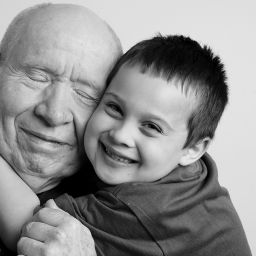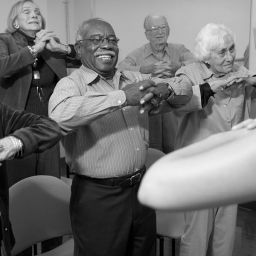Written by Kelsey Phinney, BS
As we head into a season filled with family and friends, I wanted to take a moment to share how I prepare people to meet my dad who has Parkinson’s so that the time we spend together is as comfortable as possible for everyone.
While I’m not afraid to tell people about my dad’s Parkinson’s at this point in my life, I am very deliberate about how I prepare people to meet him.
You see, sometimes I forget that many people have never met a person living with Parkinson’s.
The wonderful people I’ve met who live with Parkinson’s are so much more than a collection of symptoms.
Unfortunately, when we first meet someone, we make initial impressions based on physical characteristics and movements. We immediately judge the way that someone walks, talks, moves, looks and smiles. Since Parkinson’s often impacts most aspects of someone’s outward appearance, it can get in the way of first impressions.
So how do we help people move past the external judgments to get to know the person we love living with Parkinson’s?
Start with Open Conversation
Before my guest comes over, I tell her what to expect. In this way, my guest will feel more comfortable with the symptoms of Parkinson’s she may not have known about. This allows her to actually get to know my dad.
The conversation goes like this:
Hey, before you meet my parents, there is something I think I should prepare you for. You know how my dad has Parkinson’s?
Well, that means depending on the day, he can have some trouble getting out his words and his voice can be quiet. Sometimes he doesn’t make as many facial expressions as you would expect, but that doesn’t mean that he isn’t engaged and listening.
My dad is one of my favorite people in the world and has some of the best stories to tell, you just might have to be a little patient with him.
Address Specific Symptoms
Depending on the symptoms your loved one has, you may mention whatever else you think is relevant that your guest may encounter.
Does your family member have a tremor, a hard time eating or need a cane to walk?
Tell your guest. If your guest has questions or wants to know more, try to answer and explain openly and honestly.
Talking about a loved one’s symptoms can feel vulnerable, like you are exposing someone else’s problems. The thing is that many Parkinson’s symptoms are not hidden; they are out for the world to see.
While people associate a tremor with Parkinson’s, many people do not know that stiffness, walking problems, facial masking and voice control are symptoms as well. If we don’t talk about these symptoms openly, then our guests may mistakenly make personality judgments based on symptoms.
Remember…
Parkinson’s is nothing to be ashamed of.
Your family member living with Parkinson’s has so much to offer in a comfortable social situation.
If we can bring the symptoms into the light and talk about them, then there will ideally be less anxiety around having guests. If we can all move past the physical judgments, your guest can actually get to know your loved one. In return, your loved one living with Parkinson’s will feel more comfortable around a new friend.
My dad is not and never has been his symptoms. Yes, they are a part of how he lives, but they do not make him who he is.
He is an incredible dad who is kind, wise, funny and intelligent. It just takes intention and open conversation with my guests to help them move past the physical symptoms so they are free to get to know my dad for who he is.
I hope this post inspires you to have the same kind of open conversations with friends and family this holiday season.
 Kelsey Phinney’s dad, Davis Phinney, was diagnosed with Parkinson’s when she was five years old, and she has been interested in learning more about the brain and ways to help people living with Parkinson’s ever since. Kelsey graduated from Middlebury College in May of 2016 with a degree in neuroscience and is currently cross country skiing professionally in Sun Valley, Idaho. Learn more about Kelsey at www.kelseyphinney.com.
Kelsey Phinney’s dad, Davis Phinney, was diagnosed with Parkinson’s when she was five years old, and she has been interested in learning more about the brain and ways to help people living with Parkinson’s ever since. Kelsey graduated from Middlebury College in May of 2016 with a degree in neuroscience and is currently cross country skiing professionally in Sun Valley, Idaho. Learn more about Kelsey at www.kelseyphinney.com.


















I love this. Thank you Kelsey
Hi Kathy – Thank you for sharing your feedback. Keep checking in on our blog page for more posts by Kelsey and others. Feel free to email us at info@dpf.org should you have any questions.
Thanks for the informative article. It was a great read for me and gave me some social tools to use in the future.
Glad to hear it, thanks Brian!
This is a very timely article, thanks to Kelsey for sharing about letting folks know what they can expect from your dad. I learned quickly to make sure people know and understand how Parkinson’s effects me. Your points hit head on for what it is like to meet someone and not be ready for the way our symptoms present to others. I found myself nodding in agreement as you listed the few they might be seeing. Great job.
Hi Bill – Thank you for sharing your helpful feedback with us. Please email us should you have additional questions at info@dpf.org
I guess my main concern is that when I’m talking to some one, especially the people who know me, they get upset at me because they can’t hear what I am saying so that just makes it so I don’t want to talk anymore.
Leo, your friends want to hear from you so don’t get discouraged if your voice has gone a bit soft. The good news is speech can be improved relatively quickly if you take action now. We’ve got some great tips for communication more clearly here for you to check out, as well as the LSVT® LOUD and SPEAK OUT!® programs. Hope this helps!